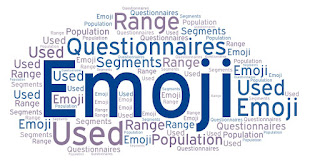.
Highlights
• Emoji interpretation was not influenced by gender or frequency of emoji/emoticon use.
• A few age-related differences existed with regard to emoji interpretation.
• Consumers of different gender and age completed emoji questionnaires similarly.
• Emoji questionnaires can be used by more and less frequent users of emoji/emoticon.
• Emoji questionnaires seem suitable for a range of population segments.
.
Abstract
The assessment of emoji questionnaires as a method in food-related consumer research is furthered by this methodological study aimed at exploring the extent to which they can be used with a range of population segments.
In the first part of the paper, a web-based survey was implemented to assess differences in the interpretation of 33 facial emoji using a check-all-that-apply (CATA) question.
Results showed that while emoji interpretation was not influenced by age and frequency of emoji/emoticon use in computer-mediated communications, age-related differences existed for a few emoji.
In the second part of the paper, differences in the completion of emoji questionnaires used to measure product-elicited emotional associations were assessed across four studies involving the evaluation of written stimuli and tasted food samples.
Gender and age did not influence consumer ability to describe and discriminate between stimuli, eliciting emoji profiles that were highly similar.
Among more frequent users of emoji/emoticon, the average number of emoji used to characterise the stimuli was significant higher than among less frequent users, and there was a tendency toward greater discrimination, but the differences were small and of little concern regarding ability of the less frequent emoji/emoticon users’ ability to perform the research task.
The findings of this research provide preliminary evidence about the suitability of emoji surveys to measure product-related emotional associations with different consumer populations.
.
Keywords
Emotion measurement, Research methods, Consumers
.
https://www.sciencedirect.com/science/article/abs/pii/S0950329317303026

